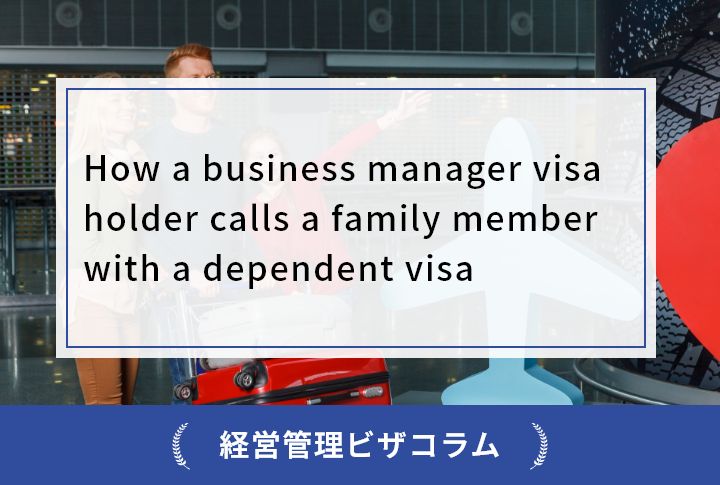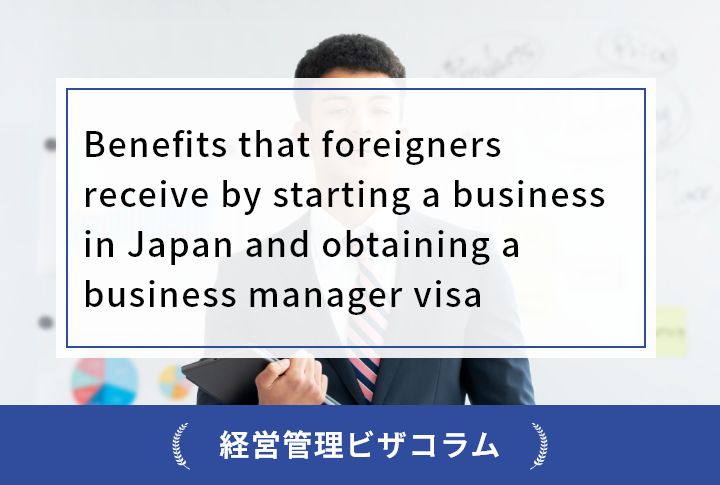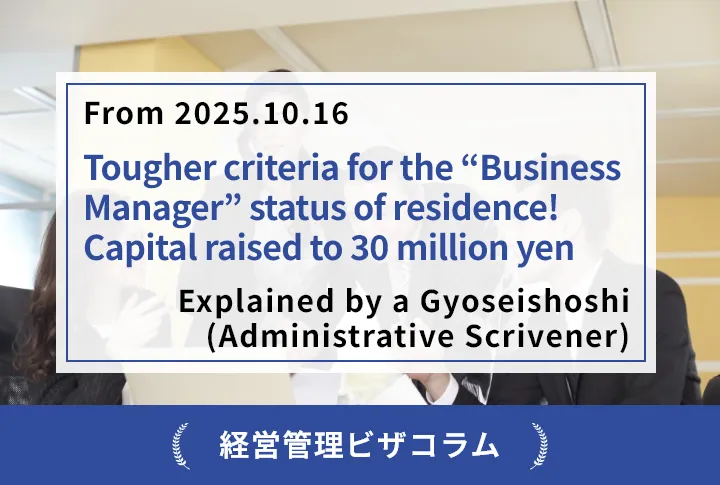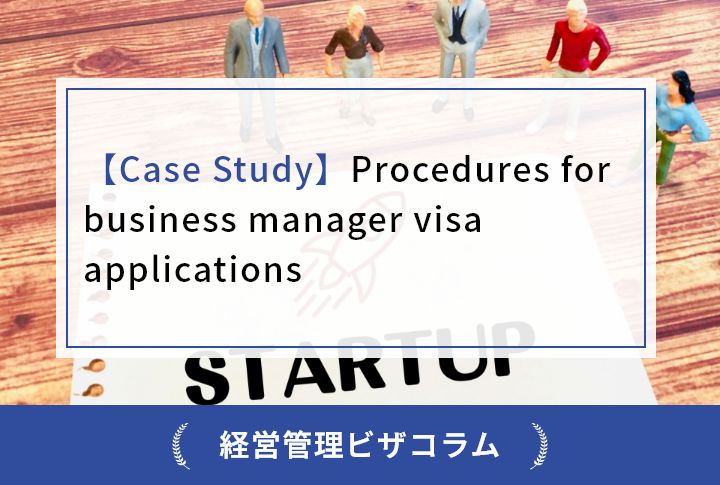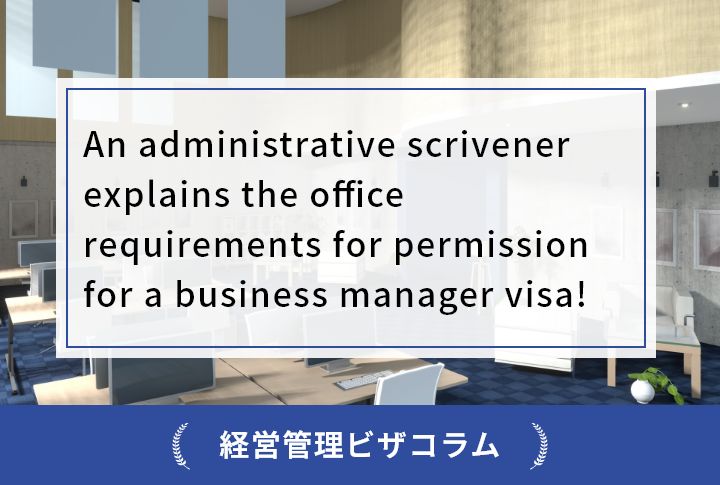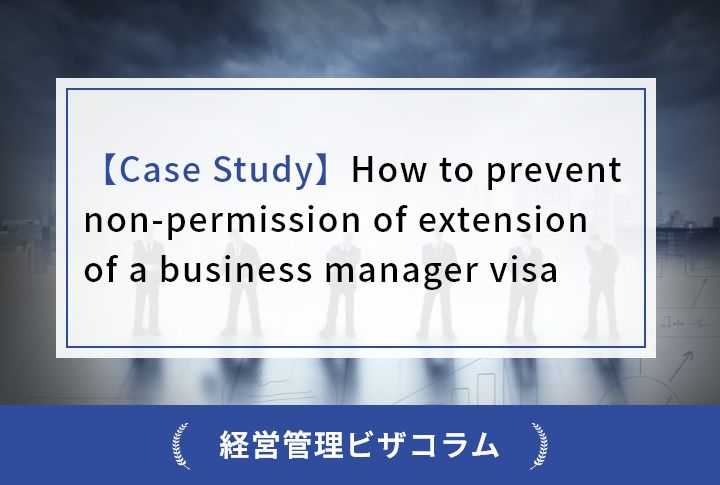Business Manager Visa Requirements (2): Ministerial Ordinance on Criteria for Landing Permission
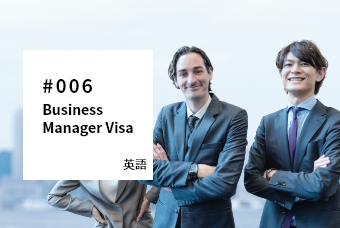
In this article, we will explain one of the requirements for a business manager visa, that is, the Ministerial Ordinance on Criteria for Landing Permission.
Index
1. The Ministerial Ordinance on Criteria for Landing Permission in relation to the business manager visas
A business manager visa is subject to the Ministerial Ordinance on Criteria for Landing Permission (Article 7, paragraph 1, item (ii) of the Immigration Act), so applicants must meet the Ordinance as well as the eligibility requirements for the status of residence. In this article, we will describe the Ministerial Ordinance on Criteria for Landing Permission in relation to business manager visas. For the eligibility requirements for the status of residence of a business manager visa, please read “Business Manager Visa Requirements (1): Eligibility for Status of Residence.”
To comply with the Ministerial Ordinance on Criteria for Landing Permission regarding business manager visas, all of the following requirements must be met.
(1) A business office for the purpose of conducting the business pertaining to the application exists in Japan (securing an office);
(2) The size of the business pertaining to the application falls under any of the following requirements (business size);
(a) the business is conducted by at least two full-time employees residing in Japan;
(b) the amount of the stated capital or the total amount of the contribution is at least 5 million yen; or
(c) the size of the business is found to be equivalent to the size set forth in (a) or (b); and
(3) If the applicant seeks to manage the business, the applicant has at least 3 years experience of operating or managing a business, and, receives a remuneration equivalent to or greater than that a Japanese national receives for the same work.
2. Securing an office
In order to be able to say that “a business office for the purpose of conducting the business pertaining to the application exists in Japan,” the following 2 points must be satisfied: (a) A single management entity carries out economic activities, occupying a certain place (one block) and (b) that there are staff and facilities, and the production or provision of goods and services is carried out continuously.
What (a) means is that an exclusive and independent space must be secured. A virtual office that does not have a private space is not recognized as an office. When using a shared office, etc. (where several people/companies share an office as tenants or subtenants of a property owned or rented by another business owner), the part used by the applicant must be clearly separated from the parts used by other people/companies. In this regard, it is not enough to separate a room with movable partitions, and it is necessary to physically and functionally separate the space used exclusively for business with fixed walls.
Next, what (b) means is that there must be sufficient physical facilities and human resources to function as an office, which may be judged differently depending on each business. For example, if you are doing on-demand trading business that do not require inventories, a place with office equipment can function as an office. On the other hand, if you are running a restaurant, it is necessary to install not only kitchen facilities but also counters and tables/chairs for customers.
Moreover, for the office, the purpose of use and title of use (*) will be examined. Rental properties are common, and it will be checked whether the office lease contract is made in the name of the business owner (or the company in the case of a company) and whether the purpose of use is for business. If the name of the lease contract is not the name of the business owner, the business owner’s title of use must be clarified by the conclusion of the sublease contract and the lender’s consent to sublease.
* Title (kengen): A legal cause that justifies a certain legal act or a factual act
Furthermore, in terms of business continuity, offices rented by month for a short-term and stalls which can be easily disposed of are not considered to comply with the Ministerial Ordinance on Criteria for Landing Permission.
One of the most frequently asked questions regarding the requirements for securing an office is whether it is possible to use a part of the house as an office.
When using a part of a house as an office, the same thing applies in the immigration examination.
The living space and the business space must be clearly to be able to show that a part of the house is used exclusively for business. When using a part of the living room as an office, it cannot be said that an office is secured because the business space cannot be distinguished clearly. A physically separated business space must be secured. For example, a house can be used as an office if the first floor is used as an office and the second floor is used for residence.
To clarify the title to use, a written consent for use must be submitted if a company will use a part of the property owned by the applicant, and the sublease agreement for business purposes and a written consent of the lender for sublease must be submitted if a part of a rented residential property is used as an office.
Furthermore, in case of using a part of a house as an office, in addition to the above, it is required to decide how to separate utility bills and to display a social sign that is similar to a signboard.
3. The scale of business
The size of business must fall under one of the following: (a) the business is conducted by at least two full-time employees residing in Japan; (b) the amount of the stated capital or the total amount of the contribution is at least 5 million yen; or (c) the size of the business is found to be equivalent to the size set forth in (a) or (b).
(a) The business is conducted by at least two full-time employees residing in Japan
The business must be conducted by at least two full-time employees residing in Japan in addition to the foreigner engaging in business management activities. This full-time employee does not include those who are residing in Japan under a status of residence listed in the Appended Table I of the Immigration Act, and must be Japanese or special permanent residents, or those who are residing in Japan under a status of residence of “Permanent Resident,” “Spouse or Child of Japanese National,” “Spouse or Child of Permanent Resident” or “Long-Term Resident.”
In addition, “full-time” does not include part-timers, and a “full-time” employee must be a person who works 5 days or more per week and whose regular working hours are 30 hours or more per week.
(b) the amount of the stated capital or the total amount of the contribution is at least 5 million yen
This requirement is for the business run in a corporate form.
The foreigner who intends to obtain a business manager visa does not necessarily have to invest. In fact, any other person can invest money to incorporate a company.
(c) the size of the business is found to be equivalent to the size set forth in (a) or (b)
When neither a) nor b) is applicable, this one can be used.
For example, when a foreigner wants to start a business in the form of a sole proprietorship, and the amount of funds invested to run the business is 5 million yen or more, such case satisfies the requirement. In this case, the total invested amount can include expenses for securing an office (including security deposit, contract fee, brokerage fee, and 1-year rent), total annual salaries of employees, and other expenses for purchasing equipment and supplies to be installed in the office. On the other hand, the purchase price (sales cost) of raw materials and commodities cannot be included.
4. The source of investment
Business manager visas do not require foreigners to invest by themselves. In fact, foreigners can obtain them even by operating business funded by another person.
However, a business manager visa is given to activities in which an applicant substantially participates in management; and therefore, the credibility of the activity contents is judged from the whole process leading up to the start of the business, including the ratio of investment by the applicant and the source of investment. For example, if all the investment is made from the applicant’s own income, it can be said that the credibility of the activity content is higher than when the business is funded by another person. Thus, there are no requirements as to the investment by the applicant or the source of the money invested into the business, but they are important factors in the immigration examination on business manager visas.
The Ministerial Ordinance on Criteria for Landing Permission requires a business size of 5 million yen or more, and from the perspective mentioned above, it is necessary to give a rational explanation as to how the money invested in the business was procured.
If you are a foreigner who has worked for a company for many years, you will be required to submit a certificate of the enrollment period and an official document showing your annual income. In case of borrowing money from parents or relatives to use for the business, you need to submit the loan agreements and demonstrate how the lenders (in this case, parents or relatives) secured the loaned amount.
5. Standards for the management category
When a foreigner engages in business management activities, there are additional requirements other than securing an office and the business size. In other words, a foreigner must have at least 3 years’ experience in the operation and/or management of business and must receive no less reward than a Japanese national would receive for comparable work.
Work experience includes the period during which the foreigner majored in business operation and/or management at a graduate school (whether in Japan or overseas). Therefore, those who have been enrolled in MBA course of a graduate school for 3 years will meet the requirements even if they have no experience in business management practice.
As to “no less reward than a Japanese national would receive,” the reward will be basically compared with rewards of Japanese people who are engaged in the same work at the same company. Since the foreigner will be working as a manager, it is natural that a higher remuneration level is required than general employees.
6. Summary
As introduced in this article, in order to obtain a business manager visa, it is necessary to have a business scale of 5 million yen or more and to secure an appropriate office. Since you will be investing a lot of money, the risk of failure will be great. Besides, preparation to start a new business takes so much time.
However, if you prepare properly according to the requirements, a business manager visa is not so difficult to obtain. Daiichi-Sogo Group supports foreigners who are serious about doing business in Japan.








